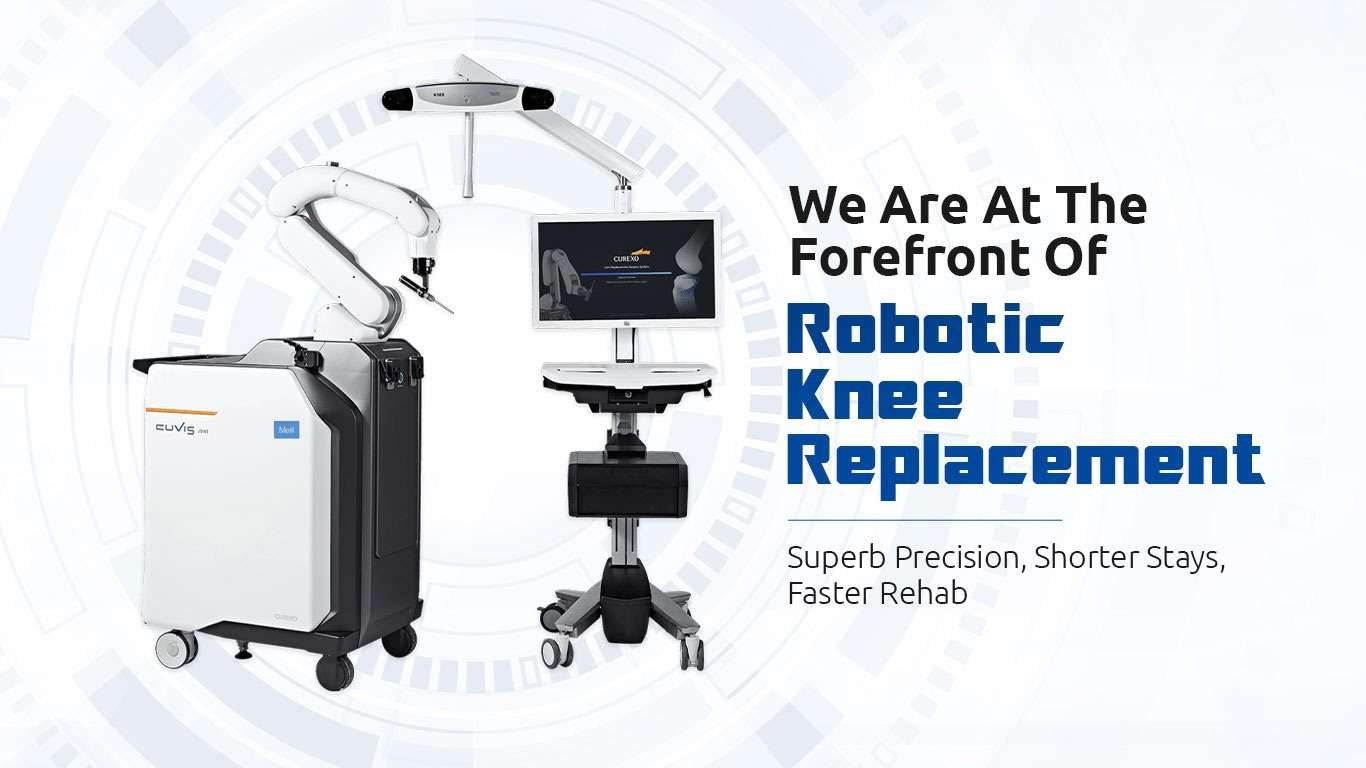

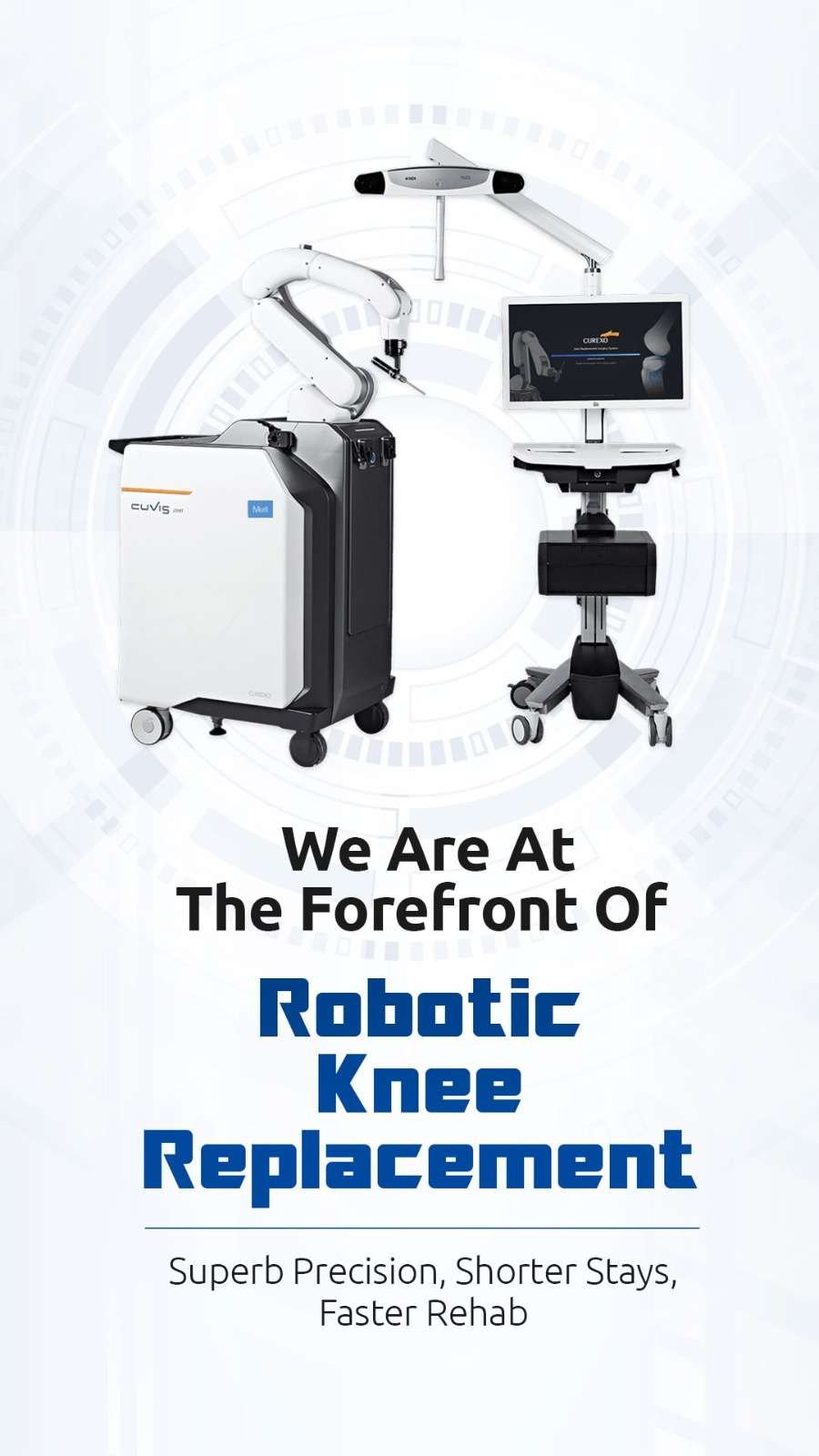
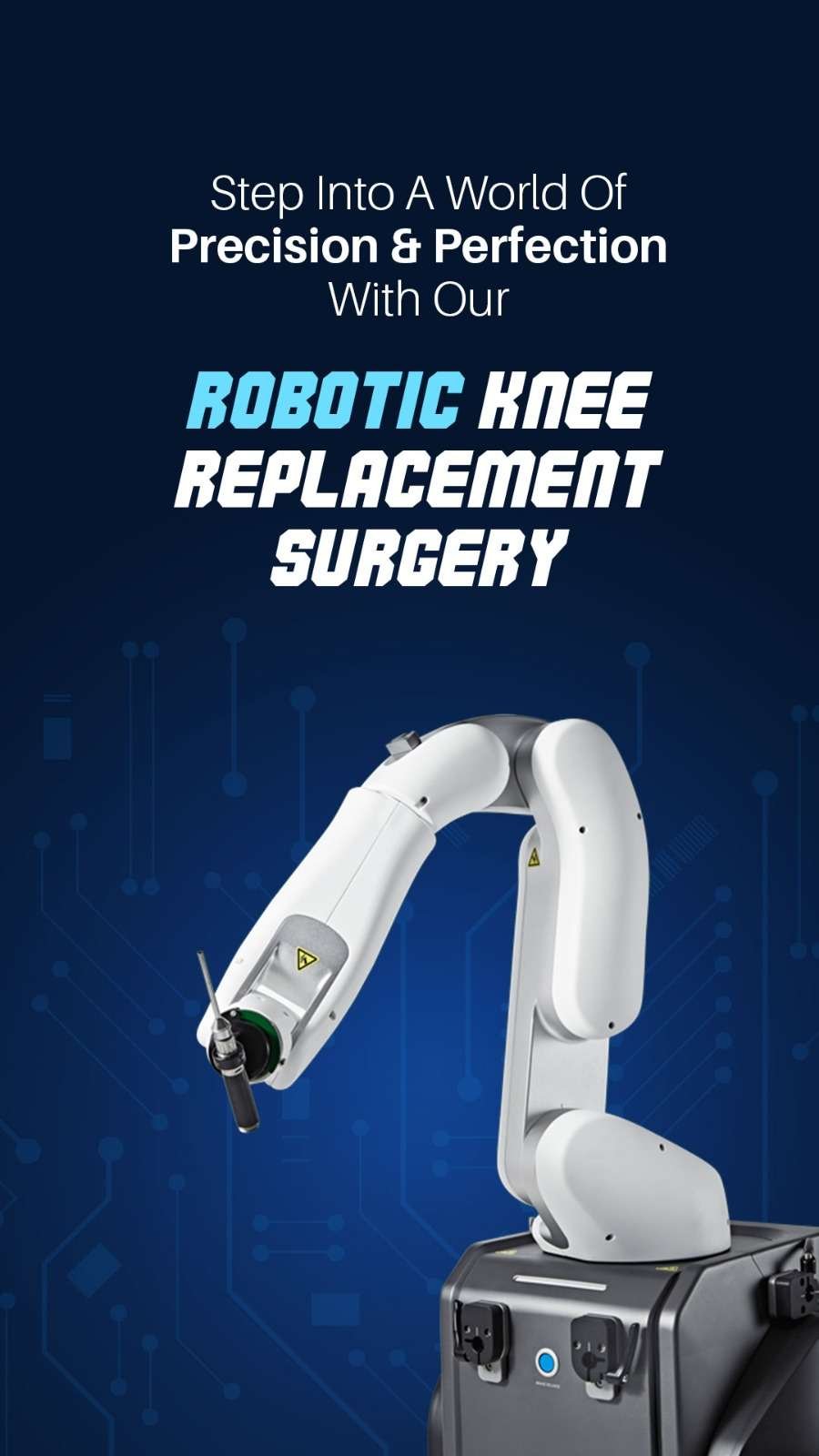
Robotic Knee Replacement Surgery in Thane has emerged as a significant & innovative development in the field of orthopedic surgery. We should note that any such development or invention does not replace the need of an orthopedic surgeon.
Nowadays robotics technology has become another important tool in the doctor’s kit. Many robotic techniques have been invented to make complex surgeries hassle-free and risk-free. Robotics technology has many advantages, for this reason it is becoming popular in the medical field.
Don’t think that robots will do your surgery now. Robotic surgery is not performed by an actual robot, instead, a skilled and experienced knee replacement surgeon uses a robotic surgical arm to execute parts of the procedure, assisting in areas that demand the steadiest hand and navigating small places. The robotic system operates only on the data that is programmed into it, but does not actually perform the surgery independently.
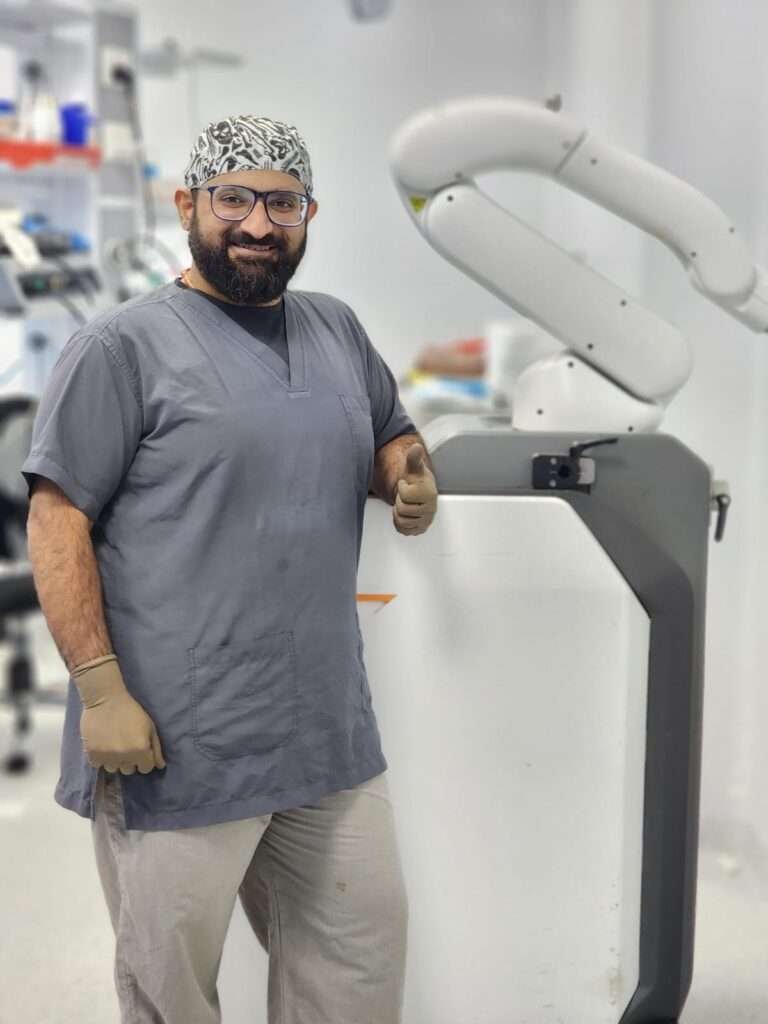


Surgery in Morning , Physiotherapy and Patients Walk in Evening

Physiotherapy , Walking and Staircase Climbing

Discharge from Hospital






Understand The Difference Between Conventional nee Replacement, Minimal Invasive knee Replacement & Robotic Knee Replacement.

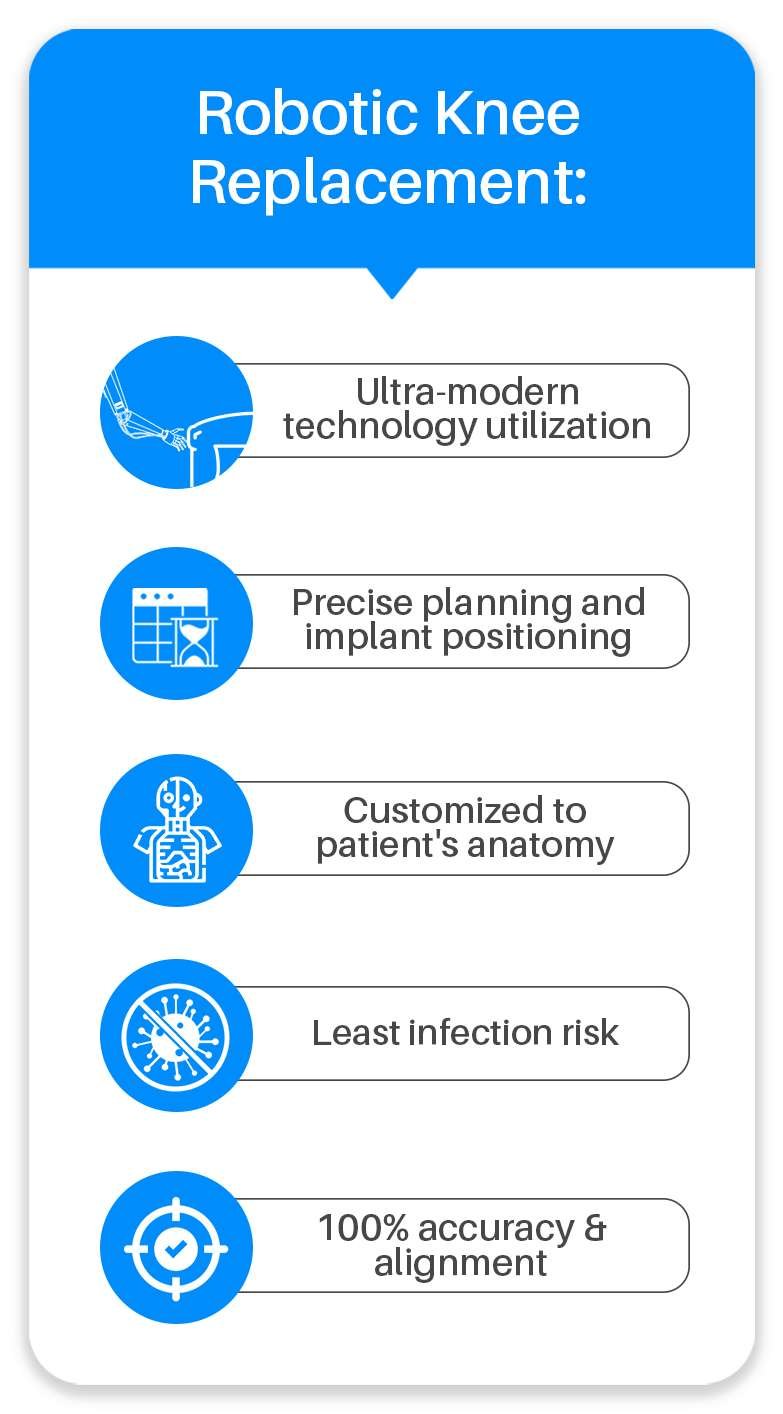
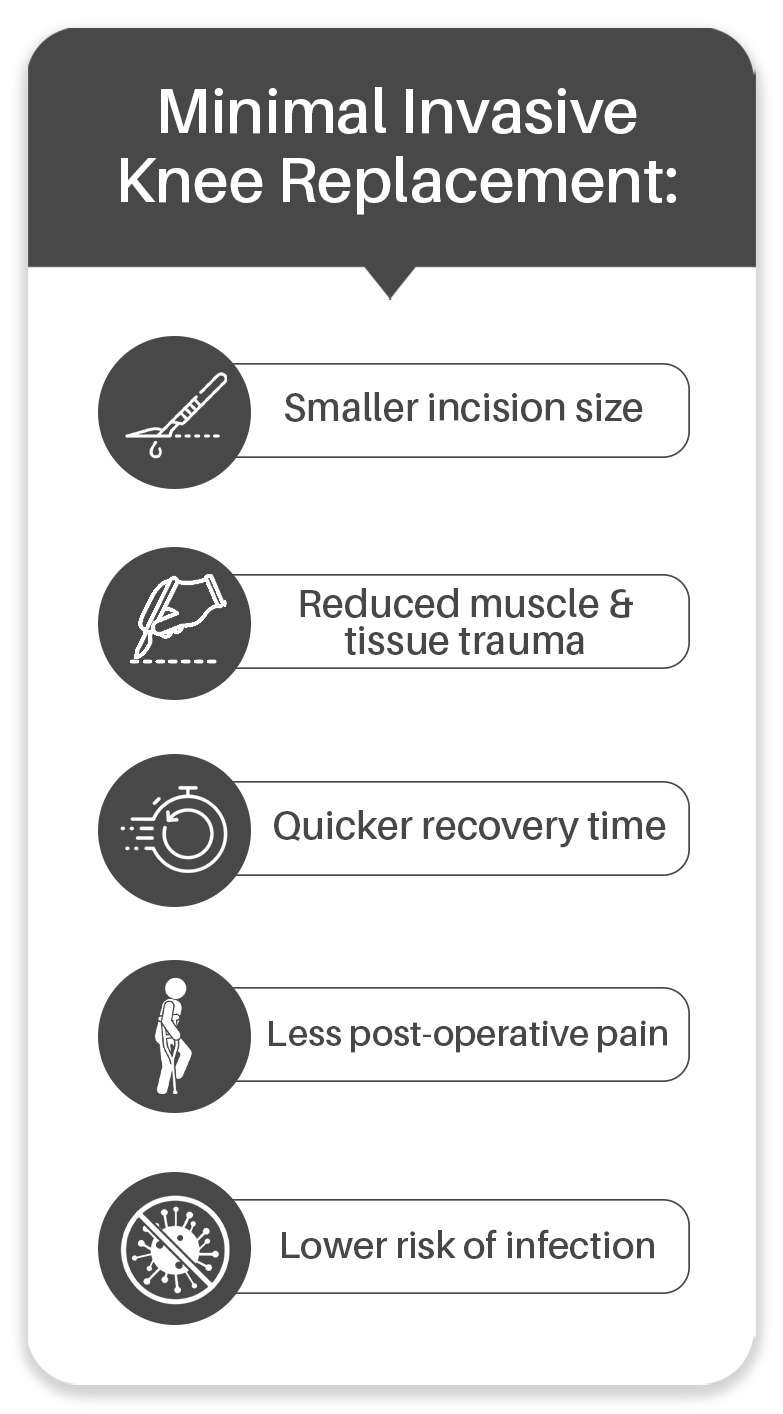

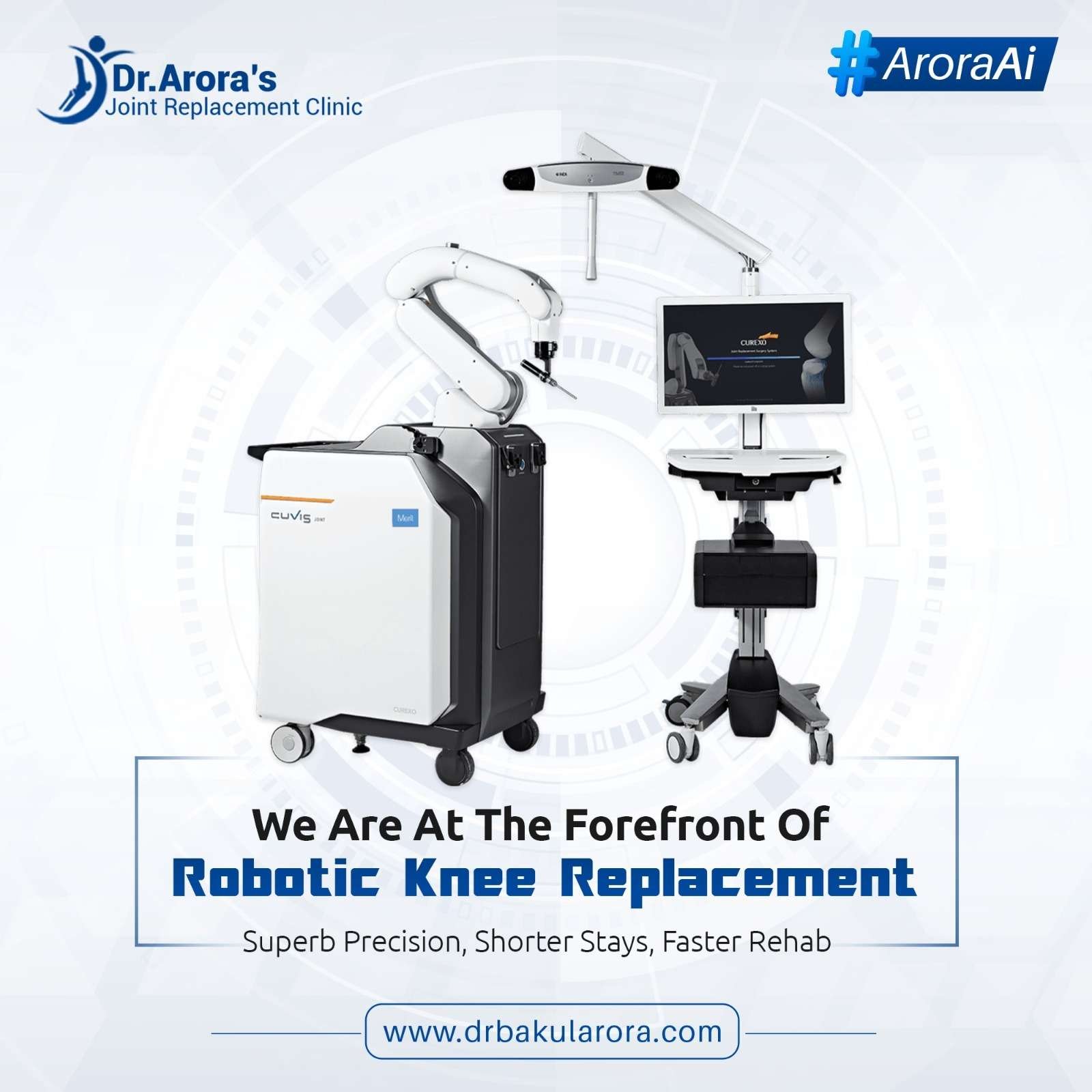
Robotic Assisted knee replacement surgery is suitable for most patients who require knee replacement surgery. However, certain factors must be considered before deciding if someone is a good candidate for the procedure. These factors include the patient’s age, weight, overall health, and the severity of their knee condition. Patients who are overweight or have a BMI over 40 may not be ideal candidates for robotic knee replacement surgery. Similarly, patients with severe deformities or extensive bone damage may not be good candidates for this procedure.
Before the procedure, patients will need to meet with their Robotic Knee Replacement surgeon in Thane to discuss their medical history and any medications they are currently taking. Patients may also need to undergo pre-operative tests, such as blood tests or X-rays, to ensure that they are healthy enough to undergo the procedure.
On the day of surgery, patients will be given anaesthesia to ensure that they are comfortable during the procedure. The surgeon will then make a small incision in the knee, and the robotic arm will be used to guide the surgeon during the operation.
Recovery from Robotic Joint Replacement typically takes around six to eight weeks. During this time, patients will need to follow a rehabilitation program designed to help them regain their strength and mobility. This may include physical therapy, which helps to improve the range of motion and strengthen the muscles around the knee.
Patients who undergo robotic knee replacement surgery typically experience less pain and discomfort during the recovery period. Additionally, they can expect to return to their daily activities more quickly than those who undergo traditional knee replacement surgery.
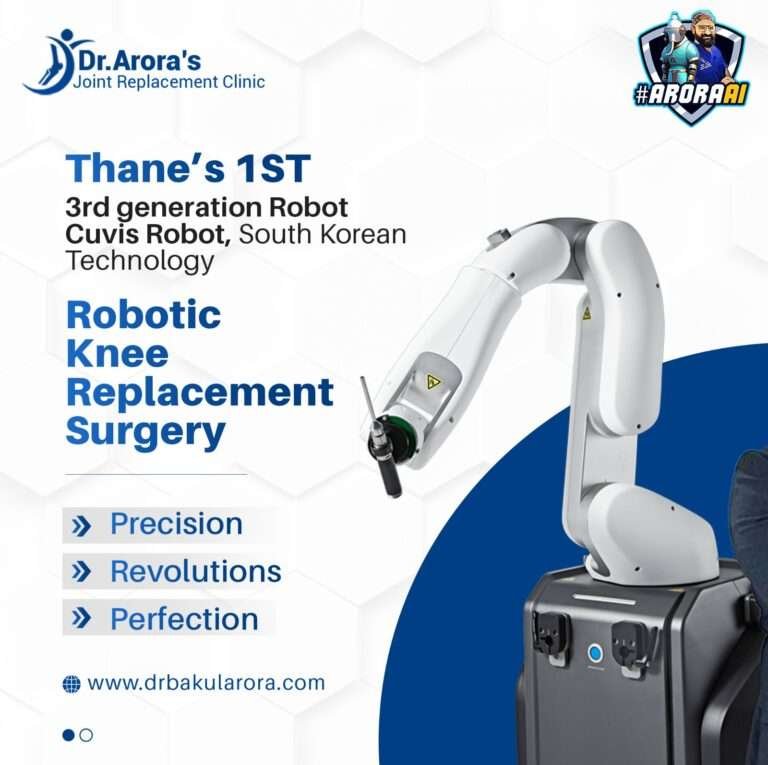
The cost of robotic knee replacement surgery in Thane may vary depending on several factors, such as the hospital, Robotic Knee Replacement Specialist fees, and the type of implant used. It is essential to discuss the cost of the procedure with the hospital and the surgeon before undergoing the surgery. In general, the cost of robotic knee replacement surgery in Thane is comparable to the cost of traditional knee replacement surgery.
Searching for a Robotic Knee Replacement Surgeon near me? Arora Clinic in Thane offers cutting-edge robotic knee replacement surgery, ensuring precision and faster recovery. Our expert surgeons are trained in the latest techniques, providing personalized care to restore your mobility and improve your quality of life. Discover more about our advanced treatment options at Arora Clinic.
Remember that not all knee replacement surgeries can be done with robotic surgery technology.
At ”Arora Clinic”, we have the ULTRA-MODERN & HIGHLY SUCCESSFUL Surgical Technology Available, the name is Robotic Knee Replacement Surgery
Precision is an extremely important in Knee Replacement Surgery. THE UNMISTAKABLE ACCURACY IS A REMARKABLE FEATURE OF ROBOTIC SURGERY
Now, Robotic Knee Replacement Surgery is available at “Arora Clinic”, Thane
robotic knee replacement Surgeon in Thane Dr Bakul Arora is one of the Internationally Renowned, Well-Trained & Highly Experienced Knee Replacement Surgeon in Mumbai, Thane. He is an expert in performing Robotic Assisted knee replacement surgery in Thane.
SAY GOODBYE TO YOUR KNEE PAIN & ENJOY THE FREEDOM OF ACTIVE LIFESTYLE WITH OUR ULTRA-MODERN ROBOTIC KNEE REPLACEMENT SURGERY
No need to go anywhere for your knee treatment as now state-of-the-art technology is available at “Arora Clinic” in Thane , Contact Arora Clinic for Knee Replacement Surgery in Thane
Yes, robotic surgery can be used for total knee replacement procedures. In fact, it is commonly used for both partial and total knee replacements. The precision and accuracy offered by robotic technology can benefit patients undergoing various types of knee replacement surgeries, ensuring a successful outcome.Is robotic knee surgery better than traditional knee surgery?
Robotic knee surgery is considered an advancement in the field of knee replacement. It offers a higher level of precision and accuracy compared to traditional surgery. This precision can result in better alignment of the artificial joint, potentially leading to improved outcomes, quicker recovery, and less pain. However, the choice between robotic and traditional surgery depends on individual factors, and your orthopedic surgeon can help you determine the best approach for your specific case.
Robotic knee replacement surgery differs from traditional methods in that it offers a higher level of precision. The robotic system provides real-time feedback to the surgeon, allowing for more accurate bone cuts and implant placement, which can lead to better long-term results and reduced pain and discomfort.
Robotic knee replacement surgery has a high success rate, with many patients experiencing significant pain relief, improved mobility, and long-lasting results. Success depends on various factors, including the surgeon’s experience, the patient’s overall health, and adherence to post-operative care and physical therapy. Consult with your surgeon to understand your individual chances of success.
While robotic knee surgery offers several benefits, it’s essential to consider potential disadvantages. These can include the cost, as robotic surgery may be more expensive. Additionally, not all medical facilities offer robotic technology, which can limit access. Furthermore, the technology is dependent on precise imaging, and there can be limitations in certain cases. Discuss these factors with your surgeon to make an informed decision.
The recovery period after robotic knee replacement surgery can vary from person to person. In general, patients can expect to stay in the hospital for a few days, followed by a period of rehabilitation and physical therapy. Most individuals can resume light activities within a few weeks, and a full recovery can take several months. Your surgeon will provide personalized guidance on your recovery timeline.
Pain is a common concern for individuals considering knee replacement surgery. While some discomfort is expected during the recovery process, the use of robotic technology often leads to more precise placement of the artificial joint, which can reduce post-operative pain. Pain management strategies and medications are typically employed to make the recovery as comfortable as possible.
The primary difference between robotic knee surgery and traditional knee surgery lies in the level of precision and technology used. Robotic surgery employs a robotic-assisted system to help the surgeon with planning and executing the procedure with real-time feedback. This precision can result in better alignment of the implant, potentially leading to improved outcomes compared to traditional surgery.
Robotic knee replacement surgery is considered safe when performed by skilled and experienced surgeons. The technology enhances the surgeon’s ability to make precise cuts and implant placements, reducing the risk of complications. As with any surgery, there are inherent risks, and it’s crucial to discuss these risks with your surgeon before making a decision.
On average, a robotic knee replacement surgery takes approximately 1 to 2 hours. However, the duration can vary based on the complexity of the procedure, the surgeon’s experience, and individual patient factors. Your surgeon can provide a more accurate estimate during your consultation.
Some of the benefits of robotic knee replacement surgery include smaller incisions, reduced blood loss, faster recovery times, and greater precision in implant positioning. These factors often result in less pain, improved knee function, and a quicker return to daily activities.
Not everyone is a candidate for robotic knee replacement surgery. Your surgeon will evaluate your specific condition and determine if you are a good candidate based on factors such as the severity of knee arthritis, overall health, and previous knee surgeries. It’s essential to consult with your orthopedic surgeon to determine if this is the right option for you.
In most cases, robotic knee replacement surgery is covered by insurance, but it’s crucial to check with your insurance provider to understand the extent of coverage. Factors like the type of insurance and your individual policy can influence the coverage details.
The recovery period may vary from patient to patient, but typically, you can expect to stay in the hospital for a short period, followed by physical therapy and rehabilitation. Most patients can resume light activities within a few weeks and gradually return to their regular activities over several months.
Like any surgical procedure, there are potential risks with robotic knee replacement surgery. These risks can include infection, blood clots, and complications related to anaesthesia. However, the use of advanced technology in robotic surgery often helps to minimize these risks.
Preparing for surgery typically involves discussing your medical history and current medications with your surgeon, as well as any pre-operative instructions. It’s essential to follow your surgeon’s guidance to ensure a successful outcome.
The success rate of robotic knee replacement surgery is generally high, with many patients experiencing significant pain relief and improved knee function. However, outcomes can vary depending on the individual’s health, the surgeon’s experience, and other factors. It’s important to discuss your expectations and potential outcomes with your surgeon.
We are really honored to receive this and we will continue to serve the society better than ever We aim to provide the world-class Knee/Hip Replacement Surgical (Minimal Invasive Surgery) treatment to every patient suffering from knee or hip pain and at the same time make their life pain-free and happy.
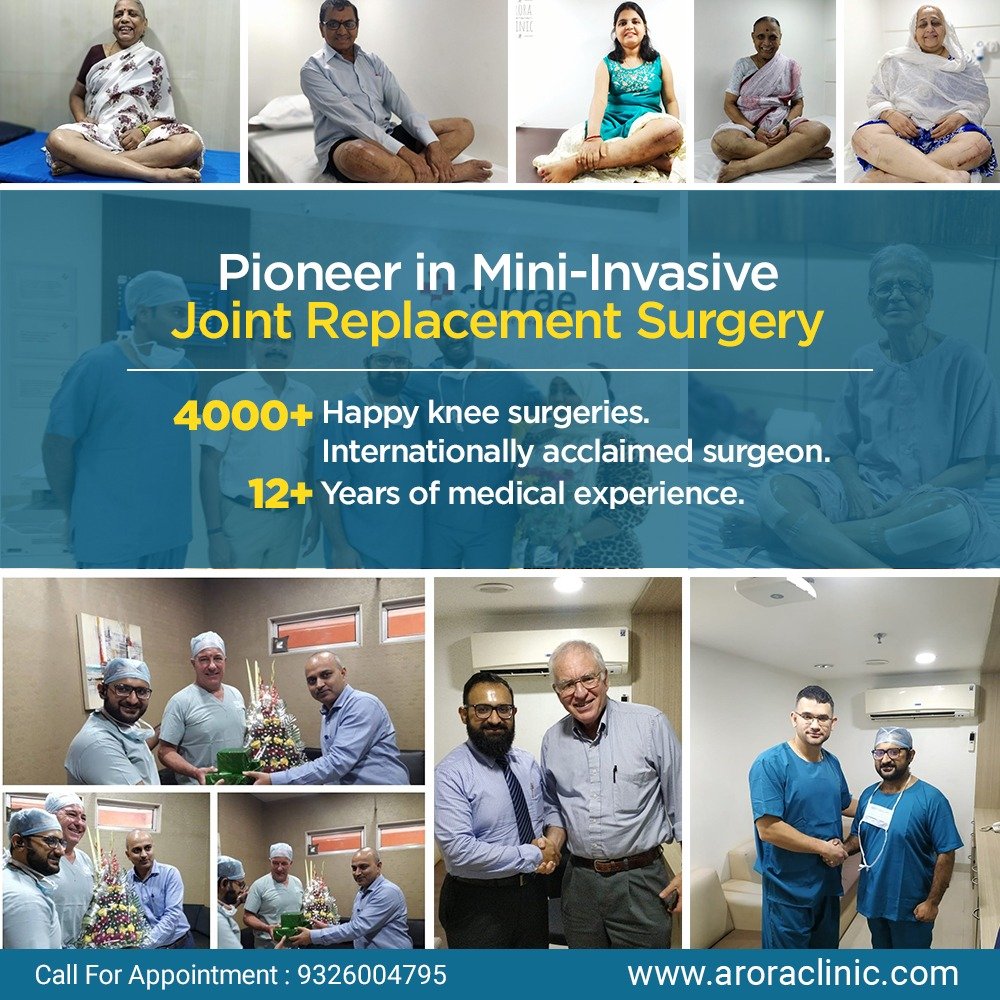
Dr. Bakul Arora’s Joint Replacement Clinic is also known as “Arora Clinic” which is located at Hiranandani Meadows in Thane, within a very convenient proximity to Mumbai. Arora Clinic dedicated clinic for Knee Replacement surgery and all kinds of Orthopaedic treatments and surgeries
The Arora Clinic is one of the most advanced Orthopaedic clinic in Thane region and dedicated to providing the best, personalised healthcare with a breadth of surgical and medical expertise. Arora Clinic offers the modern surgical treatments like “Minimally Invasive Knee Replacement Surgery” which is also called as “PAIN-LESS SURGERY” for any complex knee diseases.
Dr. Bakul Arora is a Consultant Joint Replacement & Orthopaedic Surgeon is one of the leading Knee Replacement Surgeon in Thane and Mumbai with over 4000+ successfully surgeries. Dr. Bakul Arora specialises in Mini-invasive techniques which offer multiple benefits to patients. He does the surgery using Subvastus approach for Knee Replacement surgery and Direct Anterior Approach for Hip replacement Surgery . This new techniques has many advantages for patients like its pain-less , stich-less surgery, patients walks on the same day after surgery, no blood loss, faster recovery etc.


Knee replacement is required for advanced arthritis of the knee joint, producing painful limitation of movements and restriction in activities of daily living. Knee replacement as a solution should be offered when all non–surgical methods of treatment failed and painkiller medicines and injections also failed to reduce the Knee and hip pains.
Knee replacement can be total or unicondylar, depending on the number of compartments involved. Among the total knee replacement, there are two popular designs- Cruciate Retaining, and Posterior Stabilized. The decision for the design is best taken by the operating orthopedic surgeon based on the integrity of ligaments. Patella resurfacing as a routine is a debatable subject.
Yes, most knee replacement surgeries are minimally invasive, with numerous benefits to the patient, including smaller incisions, less tissue trauma, bleeding and post–operative pain, shorter hospital stays, faster recovery, and earlier return to work and activities — in weeks rather than months. Advantages of Minimally Invasive Knee Replacement Surgery. Patients Start walking in few hours of surgery. Patients start climbing the staircase from second day of his surgery. Patients Discharge with in 3 Days from the Hospital after surgery. No blood loss during the surgery, no blood Transfusion required. Less Physiotherapy.( No Physiotherapist required for home) Less Antibiotic. Stitchless Surgery. Recovery time is just two – three week.
Bilateral knee replacement in the same sitting, can be performed if both the knee joints are damaged to the same extent, however, the medical condition of the patient, and bone quality must be kept in consideration.
Surgery through Minimally Invasive technique patients start walking on the same day and staircase climbing starts from the second day of surgery. Patients can resume his work after 3 – 4 week.
The most significant risks include Infection, Deep vein thrombosis,and Aseptic loosening of implants. The risks correlate with the co-morbid medical condition, and must be discussed with the patient before surgery.
Patients normally require hospitalization for 3-4 days in single knee replacement, and up to 5-6 days in both knee replacement surgery
A single knee replacement takes approximately 90 min- 2 hours. Both knee replacement surgery takes approx 2-3 hours.
Years ago, knee replacement surgery was reserved for elderly patients due to a high complication rate and lack of implant durability. Modern techniques have allowed orthopaedic surgeons to base surgical decisions on a patient’s pain and disability, and not necessarily chronological age. Most patients who undergo knee replacement are between the ages of 50 and 80, but surgeons evaluate patients individually and primarily on their physiologic age and demands.
Patients can resume his/her light work after discharge from the hospital, no need for rest.
Patients are given epidural anesthesia for surgery, and post op pain relief. They are expected to follow instruction from physiotherapist regarding muscle training.
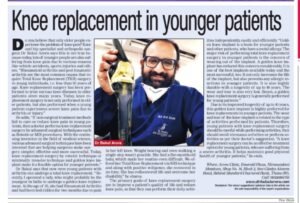
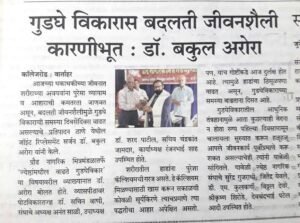
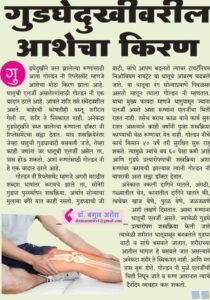

⇒ Wockhardt Hospital Mumbai Central, Mira road & Vashi
⇒ Apollo Spectra Hospital, Tardeo and Chembur
⇒ Cloud 9 Hospital, Malad
⇒ Criticare Hospital, Andheri
⇒ Arora Clinic, Hiranandani Meadows
⇒ Bethany Hospital, Vasant Vihar
⇒ Currae Hospital, Kapurbawdi
⇒ Horizon Hospital, Ghodbunder
⇒ Infinity Hospital, Majiwada
⇒ Lakecity Hospital, Khopat
⇒ Oscar Hospital, Majiwada
⇒ Drone Hospital, Bhiwandi
Arora Clinic, Shop No. 13, Block 2, Emerald Plaza, Hiranandani Meadows, Glady Alvares Road, Behind Standard Chartered Bank, Thane west – 400610
Contact: +91 93260 04795
Managed By Hopeland Healthcare @ All Rights Reserved 2023.
WhatsApp us